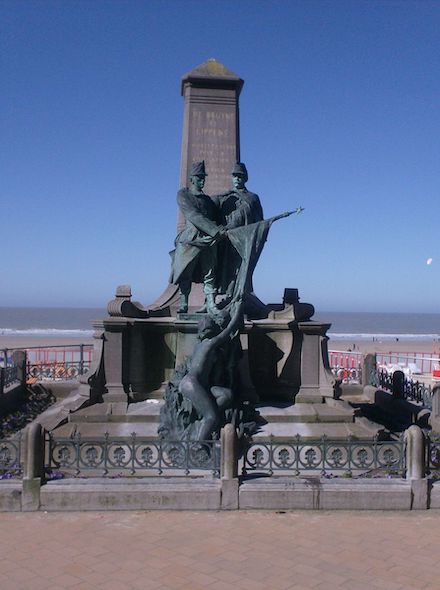On this date in 1892,* Belgian colonial agents Jozef Lippens and Henri De Bruyne were executed by the rebelling native king who had taken them hostage.
The gentlemen were a lieutenant (Lippens) and sergeant (De Bruyne) of the Force Publique colonial deployment in Belgian Congo.
Their misfortune was proximity when in 1892, rivalry over control of the eastern Congo ivory trade brought the European power into war with its erstwhile Zanzibar “Arab”** allies. (The Arabs were slave-traders, affording a classic humanitarian intervention pretext … which obviously is pretty rich coming from Belgium.)
The Congo-Arab War — which in practice was fought on both sides mostly by black Congolese troops — saw in its opening months the defection of one of the Arabs’ best commanders, Gongo Lutete,† a manumitted former slave who had risen to leadership of the Batetela and Bakussu tribes. In revenge when he switched sides to join the Europeans, the Arab leader Sefu bin Hamid seized Lippens, Belgium’s representative Resident at Kasongo, and De Bruyne, Lippens’s aide — demanding the return of his disloyal general and a settlement of hostilities as the price for these European envoys’ lives.
In fact, it was De Bruyne himself who had the honor of delivering the demand. Escorted by his captors to the eastern bank of the Lomami River on November 15, the emaciated De Bruyne shouted across to Belgian officers on the western side the terms of his captivity. The Belgians, who had the river covered by gunners, urged their countryman to leap into the water and swim for it; De Bruyne declined to abandon his comrade. “By this act of self-abnegation he was to go down in the Belgian folklore as a national hero.” (European Atrocity, African Catastrophe: Leopold II, the Congo Free State and its Aftermath)
His flight would have meant certain death for Lippens; instead, both paid the forfeit together after the Belgian commander Francis Dhanis repelled Sefu bin Hamid’s attack and smashed across the Lomani. According to the account of the war by Sidney Langford Hinde, one of many British officers employed by the Force Publique,
News also reached us here of the murder of Lippens and Debruyne, two officers representing the Free State Government, resident at Sefu’s court in Kasongo. We found out later that, after the defeat of Sefu on the Lomami (which resulted in the death of his cousin and several other noted chiefs), an advance party of the retreating Arabs arrived at Kasongo, and, by way of individual revenge, murdered the two Residents. It is probable, since we have no actual proof to the contrary, that this was done without Sefu’s orders. Twelve of these people, armed with knives hidden in their clothing, made some trivial pretext for visiting Lippens at the Residency, who, however, refused to come out and interview them. They then said that news of a big battle had come to them from Sefu; on hearing which Lippens came out, and, while talking in the verandah, was promptly and silently stabbed. Some of the murderers entering the adjoining room, found Debruyne writing, and killed him before he had learned the fate of his chief. When Sefu returned to Kasongo, a day or two afterwards, he gave orders that the pieces of Debruyne’s body should be collected and buried with Lippens, whose body, with the exception of the hands (which had been sent to Sefu and Mohara of Nyangwe as tokens), was otherwise unmutilated. The strong innate respect for a chief had protected Lippens’ body, while that of his subordinate had been hacked to pieces.
A curious fatality followed these twelve murderers. The chief of the band, Kabwarri by name, was killed by us in the battle of the 26th of February with Lippens’ Martini express in his hand. Of the others — all of whom were the sons of chiefs, and some of them important men on their own account — four died of smallpox, one was killed at Nyangwe, one in the storming of Kasongo, and the remaining six we took prisoners at Kasongo. During the trial they one day, though in a chained gang, succeeded in overpowering the sentry, and thus escaped. One was drowned in crossing a river; three more were killed, either fighting or by accident, within a month or two of their escape; and the two remaining we retook and hanged; — which brings to me a curious point. Of the many men I have seen hanged nearly all died by strangulation, and not by having the neck broken. As compared with shooting, hanging seems to me the less painful death; the wretched being becomes insensible in a very few seconds, whereas a man shot will often require a coup de grace, no matter how carefully the firing party is placed.
* December 1 is the commonly attributed date for the hostages’ butchery but it can’t be documented with certainty.
** As we’ve noted elsewhere, the term “Arabs” as used for eastern Congo by European sources in this period denotes Muslim bantus. We’re following the prevailing term here, whatever its imprecision.
† As a reward for his services, Gongo Lutete was spuriously accused of treason by a Belgian officer in September 1893 and speedily executed without any form of superior approval.
On this day..
- 1958: Istvan Angyal, Hungarian revolutionary
- 1671: Hans Erasmus, Count of Tattenbach
- 1944: Charlie Kerins, IRA Chief of Staff
- 1848: James Langford, violent drunk
- 1865: The Jacksonville Mutineers
- 1922: James Mahoney, Seattle spouse slayer
- 1868: Sam Dugan lynched in Denver
- 2010: Shahla Jahed, the footballer's lover
- 1327: Adso's lover in The Name of the Rose
- 1945: Anton Dostler, gone commando
- 1842: Philip Spencer, Samuel Cromwell and Elisha Small, on the ship yardarm
- 1581: Edmund Campion, Ralph Sherwin and Alexander Briant


